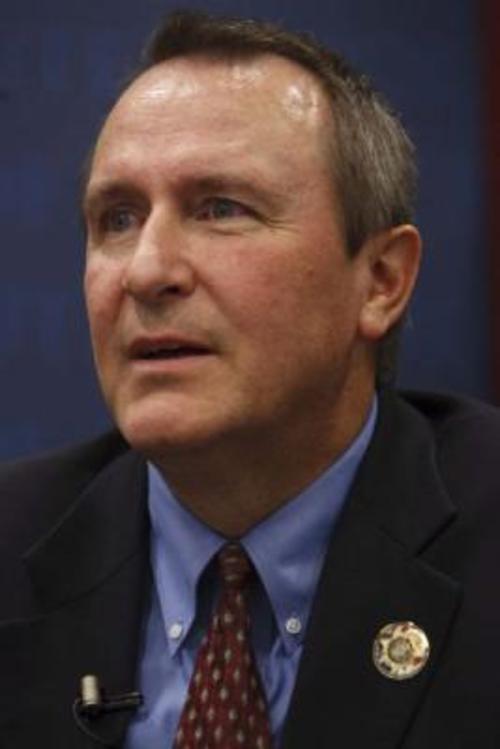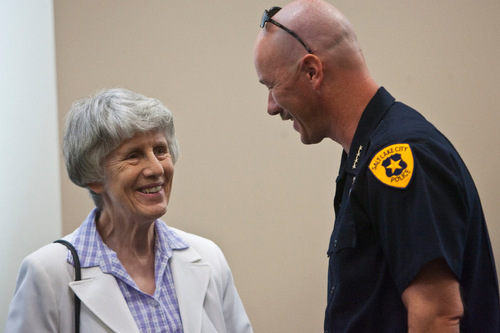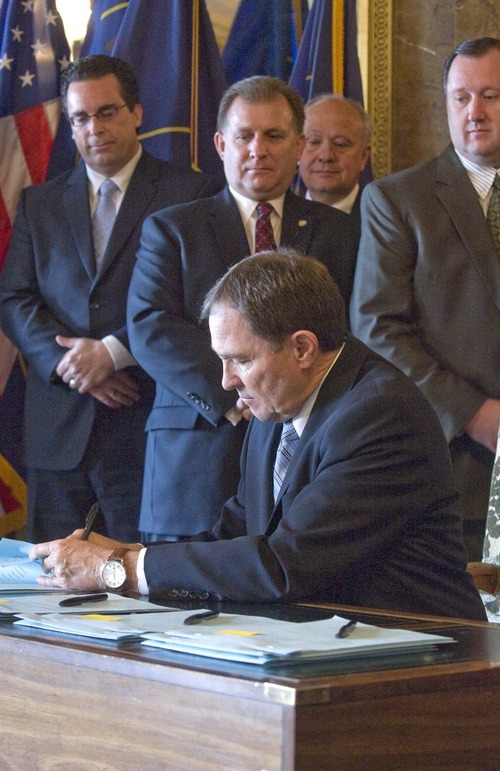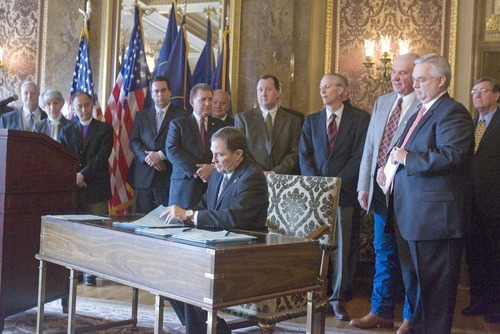This is an archived article that was published on sltrib.com in 2011, and information in the article may be outdated. It is provided only for personal research purposes and may not be reprinted.
A national version of the Utah Compact is largely written, and key officials are aiming for a signing ceremony this summer in Washington, D.C., to propel discussions on immigration reform solutions.
Utah Attorney General Mark Shurtleff said Tuesday the so-called "America's Compact" aligns closely with the Utah Compact, a document signed in November that outlines humane guidelines for immigration reform while acknowledging the federal government's authority to solve the divisive issue.
He said he'd like to see the compact signed as early as June to take advantage of the national interest sparked by Utah's controversial approach that included recently signed laws ranging from enforcement only to the state offering guest-worker permits.
The guest-worker bill, however, has been derided by a broad range of groups, ranging from the American Civil Liberties Union to tea-party members, as unconstitutional. It is also currently the subject of a repeal movement.
Shurtleff, who just returned from Washington, D.C., and met with immigration officials in the U.S. Department of Justice and U.S. Immigration and Customs Enforcement, said there is appetite for Utah's approach, as evidenced by several states either looking into, or adopting, copycat compacts.
Already, Maine and Indiana have adopted Utah-style compacts, and other states such as Kansas, Texas and Florida are moving toward similar approaches.
"We're trying to build some coalitions, and these are national people. We're getting pretty close," Shurtleff said. "We're the founders, but we'd like to move it beyond the founders as fast as possible."
In the draft of America's Compact, the preamble calls on Congress "to enact common-sense immigration policies that recognize the human dignity and economic contributions of all, as embodied in the principles of America's Compact."
It lists five principles, including a need for federal solutions; a need for law enforcement; a desire to keep families together; a recognition of economic contributions; and a call for a humane approach to the issue.
All five principles are present in the Utah Compact.
Shurtleff is tapping the Salt Lake Chamber; Salt Lake City Police Chief Chris Burbank; Bishop John Wester of the Catholic Diocese of Salt Lake City; and Sutherland Institute President Paul Mero to help find national leaders in their respective areas of focus to sign America's Compact.
Burbank said he's been in talks with a variety of police chiefs around the country about the concept of America's Compact and added that he'd work to bring the National Association of Chiefs of Police on board.
"If an avenue exists to participate in America's Compact in any area, I'm all in," Burbank said. "I will continue to work in that direction."
But Ron Mortensen, co-founder of the Utah Coalition on Illegal Immigration, said the language in America's Compact is as "disingenuous" as the language in the Utah Compact because it doesn't distinguish between illegal immigration and legal immigration.
"Who would oppose legal immigration?" Mortensen asked. "We're all for that. But we know their intention is to apply it to illegal aliens. That's their whole idea."
According to the Pew Hispanic Center, there are about 11.2 million undocumented immigrants living in the United States.
Ali Noorani, executive director of the National Immigration Forum, is assisting in bringing the compact to the national stage and said Utah's steps during the past five months have made the concept of America's Compact viable.
He said the wide swath of support from politicians, religious leaders and business groups was almost unthinkable prior to the Nov. 11, 2010, signing ceremony at the Utah Capitol.
That support included, the LDS Church, which endorsed the Utah Compact and had Presiding Bishop David Burton present when Gov. Gary Herbert signed the bills last month. But LDS Church spokesman Scott Trotter said the church wasn't involved in the drafting of America's Compact and didn't know if there would be future involvement with it.
Noorani said Utah has been a trailblazer.
"Utah changed the conversation around immigration reform," he said. "We're going to do everything we can to make sure the leadership in Utah can continue to move the country in the right direction."
Jason Mathis, executive vice president of the Salt Lake Chamber, will meet with Noorani for breakfast Wednesday in Los Angeles before they both appear on an immigration panel at the University of Southern California.
Mathis expects they will talk about America's Compact.
"The Utah Compact solves problems for a bunch of different interests," Mathis said. "We are committed to sharing that message with a larger audience."
dmontero@sltrib.com See the PDF • http://bit.ly/hUlmtd









